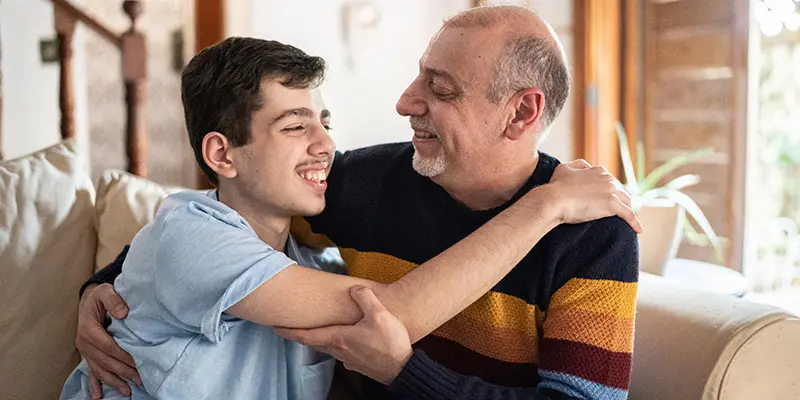
In 2008, 4-year-old Joey was diagnosed with autism. His mom Jacqueline was very pro-active and began a variety of therapies and counseling to help her son. Despite all the treatments, Jacqueline couldn’t help but think she could be doing more for him. She used to joke, saying, “If we could just look inside his head, we could figure out our Joey.” About 10 years after his initial diagnosis, she took Joey for a brain scan using a technology called SPECT, which helped doctors target his treatment more effectively.
As Jacqueline knows, having a child with autism can be frustrating. You want to help but may not be sure what you can do. Autism Spectrum Disorder (ASD) is considered the fastest-growing developmental disability, with an estimated 1 in 59 births affected. The condition is characterized by communication problems, abnormal social skills, learning disabilities, and behavioral problems—all ranging from mild to severe.
Here are 5 things that can help minimize autism symptoms:
1. Get an accurate diagnosis.
Brain imaging studies called SPECT show that autism is not one thing, it’s probably 8 to 10 things. In brain scans of people with autism, the front part of the brain often works too hard (but not always). Conversely, the cerebellum in the back of the brain, as well as the right side of the brain, often don’t work hard enough. Knowing the underlying biology of your child’s brain is critical to finding the most effective treatment. Joey’s mom Jacqueline said, “It gives you the medical facts, it gives you the medical science that you lack when you’re just trying different therapies.” Joey’s brain scans showed that not only did he have autism, but he also had an infection that was affecting his moods and behavior. With this new information, Jacqueline was able to get a clearer blueprint to treatments that are now helping Joey and the whole family.
2. Consider going gluten-free.
Gluten is the name given to proteins found in grains like wheat, barley, and rye. Research shows there is a connection between autism and an increased risk for gluten sensitivity. Some parents of children with autism have reported that when they feed their child a gluten-free diet, they see significant improvements in behavior and speech symptoms. A blood test called the celiac panel can offer insights into gluten-related health problems.
3. Supplement with vitamin D3.
Did you know that low levels of vitamin D (and particularly, vitamin D3) have been linked to autism? Vitamin D plays an essential role in the production of the neurotransmitter serotonin and is important for brain development. Research in the journal Pediatrics showed that core symptoms of autism improved significantly in a 32-month-old boy after vitamin D3 supplementation. Other supplements may help too. Click to see 10 supplements to improve autism symptoms.
4. Avoid dairy.
Dairy foods like milk, yogurt, and cheese contain a protein called casein. During the digestion process, casein contributes to the production of exorphins that bind to opiate receptors in the brain and can lead to problems with concentration, feelings of spaciness, and fuzzy thinking. For some people with ASD, eliminating dairy leads to more talking and reduced hyperactivity.
5. Seek help early.
The sooner a child with autism gets help, the more effective treatment will be. Early intervention can help with your child’s overall development and decrease symptoms as they grow up.
At Amen Clinics, we have seen more than 1,000 people with ASD (including Joey) and have used brain imaging in combination with lab work as part of a comprehensive evaluation to get an accurate diagnosis and provide targeted treatments that minimize symptoms. If your child is struggling with autism, schedule a visit or call 888-288-9834.





My grandson age 3 has autism. What’s the cost of your spect scan. Does any insurance cover your service. If not what’s the cost!
Thank you
Comment by Linda Vesuvio- Lisa — May 6, 2019 @ 2:54 AM
Hi my name is Dina and I have a friend from Guatemala and obviously she’s Spanish speaking and like to ask iif is any trouble to translate this in Spanish so my friend that she has a grandchild with this condition, thanks
Dina
Comment by Dina J Ordonez — May 6, 2019 @ 3:09 AM
What is the best ways to deal with gird besides eliminating dairy and gluten?My daughter is a nurse practitioner and wonders about breast milk for her son.
Thanks you.
Comment by Kate Zak — May 6, 2019 @ 4:20 AM
I have a grandson who lives with me and I am not happy with the treatment he is getting can you help him ?
Comment by Dianna Klein — May 6, 2019 @ 4:32 AM
Hello Dianna, thank you for reaching out. We can certainly contact you to learn more about your grandson and what treatment options we can offer.
Comment by Amen Clinics — May 6, 2019 @ 7:52 AM
Hello Linda, thank you for reaching out. We can certainly contact you to learn more about your grandson as well as explain SPECT and our treatment methods. We offer several different types of consultations and evaluations and we have doctors that specialize in a variety of conditions, including Autism. We don’t accept insurance, we are a fee-for-service outpatient clinic but we do work with our patients to collect reimbursement where possible. We also offer financing options through Care Credit. We look forward to reaching out and talking with you more.
Comment by Amen Clinics — May 6, 2019 @ 7:54 AM
I have a non verbal 33 year old son with cerebral palsy . He is non verbal. He suffered 2 concussions within the last 10 years from falls and is getting progressively worse with erratic rage and insomnia.
Would your clinic be able to do SPECT testing on him?
Thank you
Comment by Annette Filpi — July 8, 2019 @ 3:13 AM
Need cost information on SPECT, please
Comment by Pam Innes — September 27, 2019 @ 3:20 AM
Is there a fee for a consultation? If so how much? Do you have any offices on Long Island.
Comment by Pam Clifford — June 22, 2020 @ 5:02 AM
Hello Pam, thank you for reaching out. We’d be happy to contact you directly with more information regarding consultations and evaluations as well as pricing and financing options. We currently have 8 clinic locations: https://amenclinics.com/locations/.
Comment by Amen Clinics — June 22, 2020 @ 7:45 AM